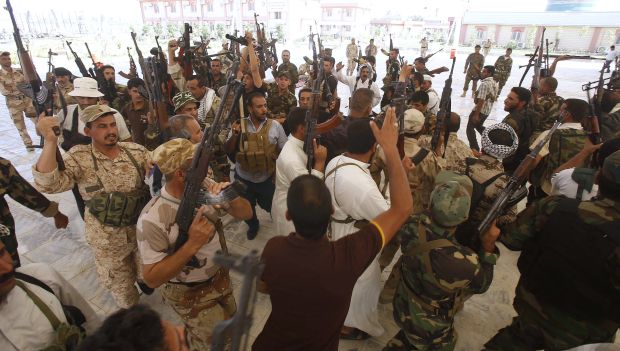The current crisis in Iraq is routinely described by international media as a “sectarian” war. The assumption is that Iraq is being torn apart because its various component parts, especially Arab Sunnis and Shi’ites, have somehow decided they can no longer live together.
How accurate is that analysis? The answer to that question could have a major impact on shaping the outcome of the crisis. Some of those who claim that Iraqis can no longer live together insist that the frontiers drawn after the collapse of the Ottoman Empire are no longer valid and that new frontiers should be envisaged for newly emerging nation-states.
At the heart of such analyses is the claim that Iraq is an “artificial country” that was unsustainable from the start. Once, on a BBC television program, I was bitterly attacked by an American university professor because I had suggested that the US should have remained by Iraq’s side for a few more years, as had been the case with West Germany after the Second World War, to help the Iraqis consolidate their new institutions.
Adopting a mocking tone, the professor shot back that, being a new state with no democratic experience, Iraq could not be compared to Germany, which had a long history and much experience of democracy.
Apparently, our professor did not know that Iraq has a history dating back at least 4,000 years, long before the first Germanic tribes appeared in Europe. Nor did he know that Germany became a nation-state in 1870. Modern Iraq attained the same status in 1921. With an interval of half a century—a mere flash in the saucepan of history—both Germany and modern Iraq emerged from the debris of empires.
As for “democratic experience,” neither Germany’s tragedy under Nazism nor Iraq under Ba’athism amounted to “democratic experience.” Under its monarchy, Iraq enjoyed as much freedom as various components of the future German state had done under their respective princes.
The subtext of my American detractor’s claim is that Iraqis, being Arabs or Muslims, are incapable of living in freedom. Arabs and Muslims, in his view, are generally genetically programed to favor despotic rule. If Iraq’s “newness” and “artificiality” means it has no right to be a united modern nation-state, why not apply the same rule to the 158 members of the United Nations that are newer and more artificial than Iraq? With that yardstick, every single country in the world could be divided into its parts and every frontier redrawn. Believe it or not, Iraq in its present form is one of the three oldest modern Arab states.
There are, of course, several powers and a few elements inside Iraq itself with a vested interest in seeing the country dismembered. Dismantling Iraq might suit the strategies of those powers and elements, but it will be no solution to the current crisis, which is rooted elsewhere.
The current crisis could best be described as a war of the sectarians, rather than a sectarian war. The mass of Iraq’s Sunnis and Shi’ites are not involved in this conflict except as victims. The fact that sectarian factions on both sides use a theological vocabulary should not mislead us. The reason is that Islamic languages, notably Arabic, lack a secular political vocabulary. That has been manifest throughout Islamic history. The first civil war in Islam, between Ali Ibn Abi Taleb and Muawiyah I, had nothing to do with rival interpretations of the faith. It was about political power and was caused by rival claims to rulership. Nevertheless, the only way that rivalry could be expressed at the time was through a theological lexicon, which, in turn and over several centuries, encouraged the concoction of a doctrinal schism.
Today in Iraq, Prime Minister Nuri Al-Maliki wishes to hang on to power as long as he can. This has nothing to do with his being a Shi’ite. Saddam Hussein, supposedly a Sunni, had a similar attitude to the bitter end. The Islamic State of Iraq and Syria (ISIS) and its allies who are wreaking havoc in Iraq are also motivated by a thirst for power, rather than any concern about a specific interpretation of the faith. They fight for political objectives disguised as religious aims.
That is underlined by the fact that no credible theologian on either side has provided a religious cover for the struggle. On the Sunni side, almost all bona fide theologians have appealed for peace and reconciliation. On the Shi’ite side, too, the overwhelming tone of the senior clergy has been in favor of calming things down. Despite a string of political pressure, senior clerics such as Grand Ayatollah Ali Al-Sistani in Najaf and Grand Ayatollah Alawi Borujerdi in Qom in Iran have refused to declare jihad against ISIS. In Qom, only one Ayatollah, Makarem Shirazi, has used the term “jihad,” indicating his ignorance of the principles and rules under which such a call is made. However, Shirazi, like Iran’s Supreme Leader Ali Khamenei, is a political rather than religious figure, and thus cannot pretend to express a theological position.
As Borujerdi has declared in a fatwa, regardless of sectarian backgrounds, Iraqis should fight in self-defense in support of the country’s regular armed forces against those who wish to dismember their state. Thus, the current conflict should not be sued by such adventurers as Moqtada Al-Sadr to revive their militias and push Iraq back to the bad old days of terror in the name of faith.
Others, including some Kurds who muse about secession, hoping to fish in muddy waters by advancing their political pawns, should also be warned that they could end up among the losers.
Iraq can and must weather its latest storm. And it is in everyone’s best interest that it does so with its sovereignty and territorial integrity intact.
